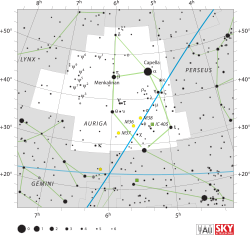5 Aurigae
| 5 Aurigae | |
 | |
| Observationsdata Epok: J2000.0 | |
|---|---|
| Stjärnbild | Kusken |
| Rektascension | 05t 00m 18,33887s[1] |
| Deklination | +39° 23′ 40,9241″[2] |
| Skenbar magnitud () | +5,95[3] (6,02 + 9,50)[4], 5,982 ± 0,009(V)[2] |
| Stjärntyp | |
| Spektraltyp | F5 V[5] |
| U–B | -0,03[6] |
| B–V | 0,415 ± 0,012[7] |
| Astrometri | |
| Radialhastighet () | 6,00 ± 1,3[8] km/s |
| Egenrörelse (µ) | RA: -10,87 ± 0,71[1] mas/år Dek.: -1,08 ± 0,46[1] mas/år |
| Parallax () | 16,74 ± 0,71[1] |
| Avstånd | 195 ± 8 lå (60 ± 3 pc) |
| Absolut magnitud () | 2,07[3] |
| Detaljer | |
| Massa | 1,48[9] eller 1,70[10] M☉ |
| Radie | 2,69[11] R☉ |
| Luminositet | 12,46[3] L☉ |
| Temperatur | 6 603 ± 225[9] K |
| Metallicitet | -0,02 ± 0,07 (Fe/H)[12]dex |
| Ålder | 2,205[9] miljarder år |
| Andra beteckningar | |
| CCDM J05003+3924AB, GCRV 2949, IDS 04534+3915, TD1 3790, GEN# +1.00031761J, IRAS 04568+3919, UBV M 10508, STT 92, GSC 02899-00369, 2MASS J05001833+3923408, uvby98 100031761, ADS 3589 AB, HD 31761, PLX 1115, WDS J05003+3924AB, AG+39 567, HIC 23261, PPM 69817, WEB 4520, BD+39 1133, HIP 23261, SAO 57559, GC 6084, HR 1599, SKY# 7823[13] | |
5 Aurigae, som är stjärnans Flamsteed-beteckning, är en trippelstjärna[10] i den mellersta delen av stjärnbilden Kusken,[10]. Den har en kombinerad skenbar magnitud på ca 5,95[3] och är mycket svagt synlig för blotta ögat där ljusföroreningar ej förekommer. Baserat på parallaxmätning inom Hipparcosuppdraget på ca 16,7[1] mas, beräknas den befinna sig på ett avstånd på ca 195 ljusår (ca 60 parsek) från solen. Den rör sig bort från solen med en heliocentrisk radialhastighet på ca 6 km/s.[5]
Egenskaper
[redigera | redigera wikitext]Primärstjärnan 5 Aurigae A är en gul till vit stjärna i huvudserien av spektralklass F5 V.[5] Den är i sig själv en dubbelstjärna som består av två stjärnor med liknande massa, ungefär 1,5 gånger solens massa vardera, med en omloppsperiod på 8,08 år.[14] 5 Aurigae A har en radie som är ca 2,7[11] solradier och utsänder ca 12[3] gånger mera energi än solen från dess fotosfär vid en effektiv temperatur på ca 6 600 K.[9]
Det yttre paret har en omloppsperiod på 1 588 år med en excentricitet av 0,536.[10] Följeslagaren 5 Aurigae B är en stjärna av magnitud 9,50 med en vinkelseparation av 4,10 bågsekunder från primärstjärnan vid en positionsvinkel på 285° år 2017.[4]
Referenser
[redigera | redigera wikitext]- Den här artikeln är helt eller delvis baserad på material från engelskspråkiga Wikipedia, 5 Aurigae, 18 februari 2020.
Noter
[redigera | redigera wikitext]- ^ [a b c d e] van Leeuwen, F. (2007). "Validation of the new Hipparcos reduction". Astronomy and Astrophysics. 474 (2): 653–664. arXiv:0708.1752. Bibcode:2007A&A...474..653V. doi:10.1051/0004-6361:20078357.
- ^ [a b] ”Basic data: V* 5 Aur – Double or multiple star” (på engelska). Centre de Données astronomiques de Strasbourg. http://simbad.u-strasbg.fr/simbad/sim-basic?Ident=5+Aur&submit=SIMBAD+search. Läst 6 februari 2019.
- ^ [a b c d e] Anderson, E.; Francis, Ch. (2012), "XHIP: An extended hipparcos compilation", Astronomy Letters, 38 (5): 331, arXiv:1108.4971, Bibcode:2012AstL...38..331A, doi:10.1134/S1063773712050015.
- ^ [a b] Mason, Brian D.; Wycoff, Gary L.; Hartkopf, William I.; Douglass, Geoffrey G.; Worley, Charles E. (2001). "The 2001 US Naval Observatory Double Star CD-ROM. I. The Washington Double Star Catalog". The Astronomical Journal. 122 (6): 3466. Bibcode:2001AJ....122.3466M. doi:10.1086/323920. Vizier catalog entry
- ^ [a b c] Abt, Helmut A. (2008). "Visual Multiples. IX. MK Spectral Types". The Astrophysical Journal Supplement Series. 176: 216–217. Bibcode:2008ApJS..176..216A. doi:10.1086/525529.
- ^ Guetter, H. H. (1980). "UBV Photoelectric Photometry of 259 PZT Stars". Publications of the Astronomical Society of the Pacific. 92: 215. Bibcode:1980PASP...92..215G. doi:10.1086/130650.
- ^ van Leeuwen (2007). ”Hipparcos, the New Reduction” (på engelska). http://vizier.u-strasbg.fr/viz-bin/VizieR-5?-out.add=.&-source=I/311/hip2&HIP=23261. Läst 6 februari 2019.
- ^ Gontcharov, G. A. (2006). "Pulkovo Compilation of Radial Velocities for 35 495 Hipparcos stars in a common system". Astronomy Letters. 32 (11): 759–771. arXiv:1606.08053. Bibcode:2006AstL...32..759G. doi:10.1134/S1063773706110065.
- ^ [a b c d] David, Trevor J.; Hillenbrand, Lynne A. (2015), "The Ages of Early-Type Stars: Strömgren Photometric Methods Calibrated, Validated, Tested, and Applied to Hosts and Prospective Hosts of Directly Imaged Exoplanets", The Astrophysical Journal, 804 (2): 146, arXiv:1501.03154, Bibcode:2015ApJ...804..146D, doi:10.1088/0004-637X/804/2/146.
- ^ [a b c d] Cvetkovic, Z.; Novakovic, B. (December 2006). "Orbits For Sixteen Binaries". Serbian Astronomical Journal. Bibcode:2006SerAJ.173...73C. doi:10.2298/SAJ0673073C.
- ^ [a b] https://www.universeguide.com/star/5aurigae. Hämtad 2020-02-18.
- ^ Gáspár, András; et al. (2016). "The Correlation between Metallicity and Debris Disk Mass". The Astrophysical Journal. 826 (2): 171. arXiv:1604.07403. Bibcode:2016ApJ...826..171G. doi:10.3847/0004-637X/826/2/171.
- ^ "5 Aur". SIMBAD. Centre de données astronomiques de Strasbourg. Hämtad 2020-02-18.
- ^ Tokovinin, Andrei (2014). "From Binaries to Multiples. Ii. Hierarchical Multiplicity of F and G Dwarfs". The Astronomical Journal. 147 (4): 87. arXiv:1401.6827. Bibcode:2014AJ....147...87T. doi:10.1088/0004-6256/147/4/87.




